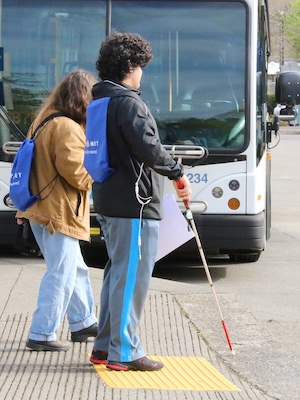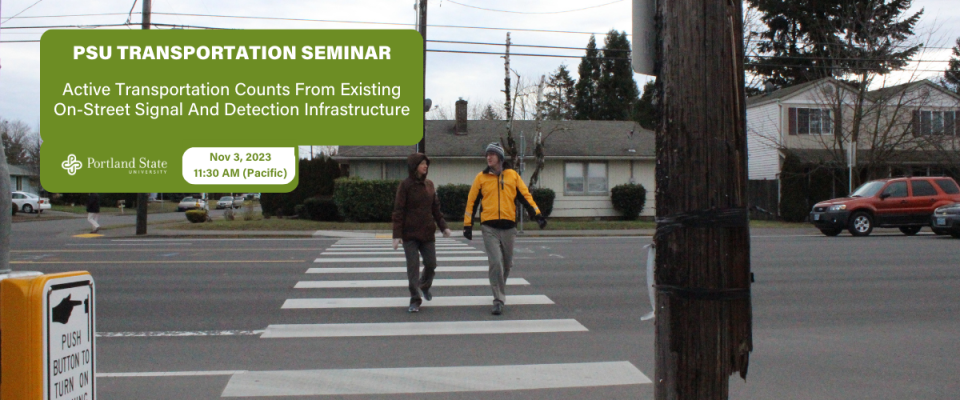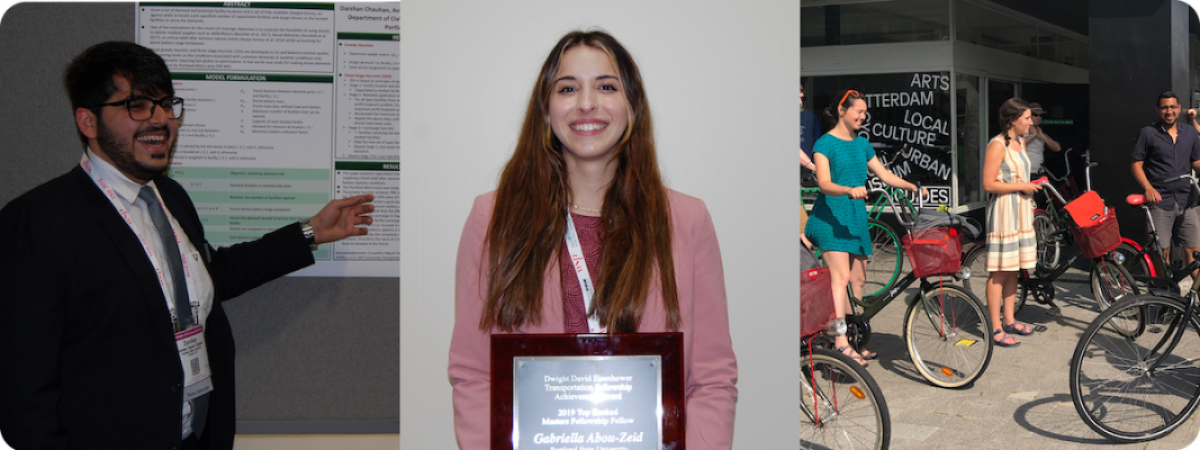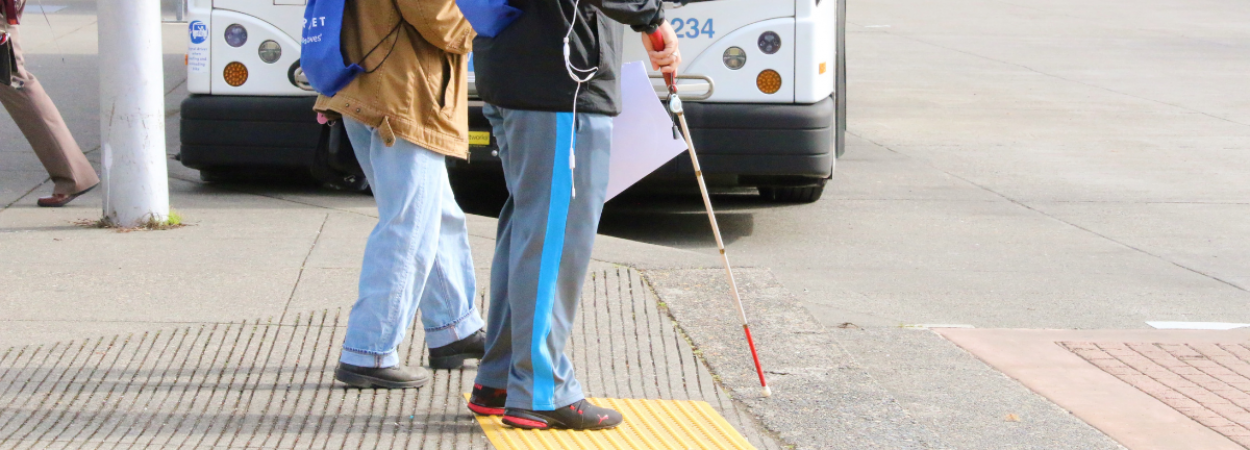For people who are blind or have low vision, navigating public transportation can be a daunting challenge. Portland State University (PSU) is partnering with TriMet—the transit agency serving the Portland, Oregon metropolitan area—to make it easier.
"Human Wayfinding" is a new collaborative research project funded by TriMet, aimed at helping the agency improve the travel experience for transit riders with low vision.
Amy Parker, coordinator of the Orientation and Mobility (O&M) Program in PSU's Special Education Department, is leading the research. Students studying to be O&M professionals will work with TriMet to provide specialized support to low-vision travelers, using best practices developed by the blind and Deafblind community.
"If more people who are blind can get to where they are going, then that means everyone has a better shot at navigating. The signage, the markings, the clarity—for everyone it will become a smoother and more equitable process," Parker said.
This is a key principle of universal design—the idea that creating environments to accommodate all types of people will benefit everyone. Eileen Turvey, Director of Accessible Transportation Programs for TriMet, echoes this sentiment.
"Instead of building stairs somewhere, we're going to build a ramp. Because a ramp doesn't just help someone with a mobility device; it also helps a parent with a stroller, or it helps a bicyclist who doesn't want to have to carry their bike upstairs," Turvey said.
WHAT WILL THE RESEARCH DO?
 Research participants from the blind and Deafblind communities will walk or roll through transit sites and give feedback, as well as take part in focus groups and share their travel behavior data. One such event has already been held: On April 11, a group of students with low vision took part in a simulation at the Beaverton Transit Center where they practiced navigating the space.
Research participants from the blind and Deafblind communities will walk or roll through transit sites and give feedback, as well as take part in focus groups and share their travel behavior data. One such event has already been held: On April 11, a group of students with low vision took part in a simulation at the Beaverton Transit Center where they practiced navigating the space.
Students in the O&M program will help recruit and organize research participants, analyze the qualitative and quantitative data, and gain experience liaising with transit professionals and members of the public.
Through systematic testing, the research team will evaluate the wayfinding processes involved in riding TriMet for safety, reliability, efficiency, and comfort. They will also help to refine and improve guidance for signage, tactile maps, auditory feedback, detectable warning surfaces and other accessibility features.
One of the accessibility improvements that TriMet has already identified and is implementing across its transit network is the Falcon text-to-speech device, which can read aloud updates such as route changes, closures, and other service information. From this research, TriMet hopes to gain insight on additional accessibility features, including:
- Tactile Maps: Spatial information accessible to people who are blind or have low vision.
- Written descriptions of stations and routes: Information to allow independent mobility through TriMet transit centers and light rail platforms.
- Familiarization Events: A pre-opening event held at a TriMet public facility to provide people with disabilities with an opportunity to explore the accessibility features implemented in the design of the facility so that they can effectively use these features.
- Design improvements to enhance accessibility: Suggestions made during TriMet project meetings, or during site walks of transit centers, to improve their use by people who are blind or have low vision.
- Design improvements to establish a template: Accessibility recommendations for future transit center, light rail platform, or frequent bus stop locations.
BUILDING ON EXISTING WORK
In 1985, the TriMet Board of Directors formed a Committee on Accessible Transportation (CAT), an advisory body that provides TriMet with ongoing input on topics related to accessibility. Members of the CAT have worked with PSU in other areas as well, including participating in Mobility Matters, a virtual conference exploring the connection between navigation and community.
The new PSU partnership with TriMet will be partially modeled after a similar project led by Parker, with Seattle's Sound Transit agency. The Sound Transit Project was launched in 2023, and is a structured practicum program where PSU O&M students design and evaluate tools to support wayfinding and access in transit stations.
Both PSU/transit agency partnerships are founded on a commitment to community engagement, with emphasis on listening to people with disabilities, including those with visual impairments or deafblindness, about what would support their travel needs.
PERFECT TIMING FOR A PARTNERSHIP
Eileen Turvey directs TriMet's Accessible Transportation Programs. The goal of these programs is to enable riders to travel as independently and as safely as they can. It's not just at the stops and on the vehicles where accessibility matters—it's also essential for the agency's website and trip planning tools to be usable, and communication and engagement with the whole community is necessary to serve customers who have visual impairments.
At TriMet we view ADA compliance as the floor, not the ceiling. How do we do better than that?" Turvey said.
Turvey was aware of Parker's work with the Orientation and Mobility, or O&M, program at PSU because Parker's classes use TriMet's Jan Campbell Mobility Center, an indoor/outdoor space where people can practice navigating transit infrastructure, for training workshops. So when she learned that TriMet had received federal funding to redesign the Oregon City Transit Center and the Beaverton Transit center, and make some modifications at Gateway Transit Center as well—and that project manager Michael Corrente was looking for guidance on accessibility features—she immediately thought of Parker.
"We thought, as long as we're out there and we're tearing up concrete and moving things around, why don't we look at some best practices so that we can design for the whole community?" Turvey said.
Corrente is a Senior Project Manager in the Major Projects Group at TriMet, and is the lead for the Layovers and Transit Centers (LOTC) Program. For the redesigning of the Beaverton, Oregon City, and Gateway Transit Centers, he knew he wanted to place a high priority on making things accessible for all travelers.
"I need to know how people navigate through different types of disabilities and challenges, so that we can make improvements that are for everybody. This is the opportunity now, and as project manager, if I don't push it—if I don't take it on—who's going to do it?" Corrente said.
He hopes that with the guidance from this research, the three overhauled transit centers can serve as prototypes for future redesigns.
"There are things we can do that may not be high dollar, but they are high value: Things as simple as adding a few tactile panels to indicate what zone you're in, or where the Falcon is," Corrente said.
Corrente spoke about the upcoming redesign of the Beaverton Transit Center with Patricia Kepler, a member of TriMet's CAT, at the 2025 edition of Mobility Matters. (Curious about transit accessibility? More transit videos from Mobility Matters are available here, with optional captions and audio descriptions.)
Learn more about the project: Human Wayfinding.
Photos by Zoë Small
Portland State University's Transportation Research and Education Center (TREC) is a multidisciplinary hub for all things transportation. We are home to the Initiative for Bicycle and Pedestrian Innovation (IBPI), the data programs PORTAL and BikePed Portal, the Better Block PSU program, and PSU's membership in PacTrans, the Pacific Northwest Transportation Consortium. Our continuing goal is to produce impactful research and tools for transportation decision makers, expand the diversity and capacity of the workforce, and engage students and professionals through education, seminars, and participation in research. To get updates about what's happening at TREC, sign up for our monthly newsletter or follow us on social media.







